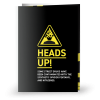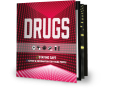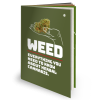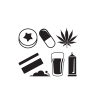Cannabis harm reduction information
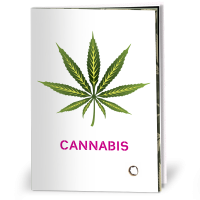
Buy a printed version of this information in our substance shop
CANNABIS
HOW IS IT USED?
SMOKED AS A JOINT
Cannabis is usually smoked in a cigarette called a ‘joint’, normally rolled with tobacco.
SMOKED USING A BONG OR PIPE
Smoked in a pipe or a water ‘bong’ (a pipe which passes the smoke through water to cool and filter it).
When smoked, cannabis usually affects you quite quickly.
VAPORISERS
Vaporisers (about £50 to buy) are less risky - they get just hot enough to release the THC (Tetrahydrocannabinol, the bit that gets you stoned) but not the tar.
EATING
Sometime people will eat cannabis, mixed with other ingredients, eg. in biscuits (cookies) or cakes.
- If it is eaten, the effects take much longer to be felt, but can build up and get stronger over a longer time.
- It is much harder for someone to control the dose of the drug when cannabis is eaten.
WHAT IS CANNABIS?
Cannabis generally refers to the dried flowers of the female plant. It comes in the form of resin, normally extracted from the flowers of the plant, the dried flowers, or very rarely as
cannabis oil.
WHAT ARE THE EFFECTS?
Cannabis affects people in different ways. It depends on how you feel, how much you smoke and where and who you are with, but generally, when smoked, the effects are felt quite quickly.
They can range from feeling relaxed, happy and laid back to feeling wired and paranoid.
For some people, effects can include eating large amounts of biscuits, pot burns in your favourite clothes and sitting on your bum all day.
PROBLEMS
PHYSICAL HEALTH
Your lungs were not meant to take in hot, noxious gases, so smoking cannabis, even on its own, is probably not good for your lungs .
Cannabis is usually smoked with tobacco which is known to cause serious health problems including cancer and heart disease. The nicotine in tobacco is very addictive
MENTAL HEALTH
If you feel down, cannabis will probably make you feel worse. You may feel sick, confused and worried – but these feeling will normally wear off as the cannabis does.
If you have an underlying mental health problem or one that you may not know about, using cannabis may bring it on. So, if you find yourself at the checkout at your local Asda stocking up on silver foil to stick to the inside of your house to stop people reading your mind, you might want to consider cutting down or even sacking cannabis altogether.
DEPENDENCY
Using cannabis can become a habit. Regular users may find it hard to stop. If you smoke cannabis with tobacco you may find it even more difficult to give up cigarettes
MOTIVATION
When you use cannabis, you may keep forgetting what you’re doing and find it hard to concentrate. You might find you can’t work or study properly. You may still feel spaced out the next day.
ACCIDENTS
Cannabis can make you clumsy and slow to react. Don’t smoke cannabis if you are going to drive or operate machinery.
REDUCE THE RISKS
If you are going to start or continue to use cannabis, the advice below will help reduce the impact to your health.
Don’t use tobacco
Don’t hold smoke in your lungs
You won’t get more stoned. It just means more tar and other nasty chemicals will stick to your lungs.
Don’t use a cigarette filter for a roach
You will inhale more tar. Use plain card, loosely rolled up, for a roach – this lets the smoke flow easily.
Don’t use too many papers
Three skinners will do – or you’ll breathe in too much burnt paper.
Don’t use plastic bottles, rubber hoses, PVC, foil and aluminium
these give off toxic fumes when hot. Glass, steel or brass pipes are safer.
Maybe you like to get high, but not everyone does. Show some respect. Don’t smoke near people who don’t take it – especially children and people with breathing problems.
IN CONTROL
- If one of your friends is having a bad time sit them somewhere quiet and comfortable, away from others. Stay calm and keep them calm, take their mind off things by talking to them. Tell them the bad feelings will wear off soon.
- Cannabis lowers blood-sugar levels. You will feel better if you have something sweet to eat or drink.
- If you feel bad when stoned you should think about stopping, if only for a short time. Give your mind and your body a break.
- If you use it every day, have a couple of days off each week. Smoke fewer spliffs a day, or put a bit less in them.
- If you are trying to cut down, avoid places, people or events that remind you of cannabis.
- Don’t buy extra, thinking you will save some for tomorrow – you probably won’t.
CANNABIS AND THE LAW
Cannabis, is a Class B drug, which is illegal to possess, produce or supply.
According to the law, if you’re prosecuted for possession, you can get up to 5 years in prison, an unlimited fine or both. If you’re prosecuted for supply and production, you can get up to 14 years in prison, an unlimited fine or both.
DRUG DRIVING
It’s illegal to drive while over the permitted level of cannabis in your system. If you test positive, you’ll face a driving ban, a large fine, or even imprisonment.
POSSESSION FOR PERSONAL USE
When it comes to possession for personal use, some police forces will take a different approach to try to keep you out of the criminal justice system, especially if you’re under 18. So, in practice, the police will choose from the following range of options (depending on where you live in the country and whether you’ve committed any crime or similar offence before):
- Issue a warning.
- Make you pay an on-the-spot fine.
- Give you a ‘community resolution’, which will probably involve you doing an educational course on drugs. You won’t have a criminal record, but it will show up on an enhanced DBS check.
- Issue a ‘conditional caution’. This is likely to involve you doing a rehabilitation course relevant to using cannabis, or having to do unpaid work, or pay a fine. A conditional caution will go on your criminal record.
- Or you can be charged with the offence.
If you’re under 18, the police are allowed to tell your parents or carers.
Persistent offenders will be prosecuted and appear in court.
Check the laws and guidelines, as these can change over time.
Find out about penalties here:
gov.uk/penalties-drug-possession-dealing
